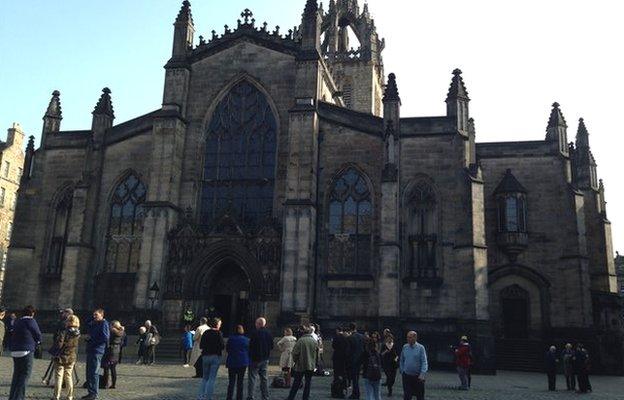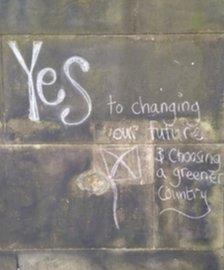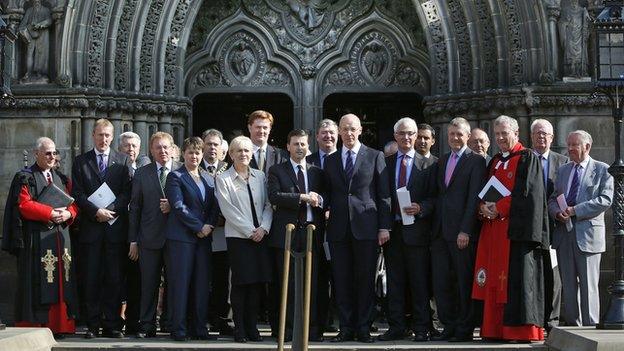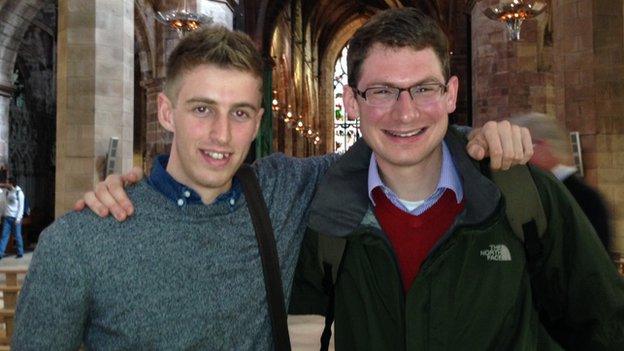Church bells ring to reunite Scotland after referendum
- Published

On a sunny morning in Edinburgh, the bells of St Giles' Cathedral rang with optimism.
A service of reconciliation was held not just for Scotland's capital city, but the whole nation.
Outside the historic cathedral, in the heart of the city which decisively rejected independence - voting 61.1% No and 38.9% Yes - there are still signs of the schisms of the past few weeks.
"Yes" is emblazoned across the statue of influential Scottish economist and philosopher Adam Smith. The cathedral is also marked with a few messages of "Yes", although written in chalk that can easily be wiped away.

The cathedral had more than a few Yes messages on its walls
But the Church of Scotland hopes a message of unity will help heal the divisions of the referendum by reminding the country of its "shared values" and "common purpose".
The service was expected to be attended by more than 1,000 people and most of the seats in the cathedral, straddled between Edinburgh Castle and Holyrood Palace on the Royal Mile in the heart of the capital, were full by the time the service started.
Political figures from both sides of the debate - including Scottish Finance Secretary John Swinney, Better Together leader Alistair Darling, Scottish Secretary Alistair Carmichael and Liberal Democrat Chief Secretary to the Treasury Danny Alexander - had come together to sing from the same hymn sheet.
In his sermon, Rt Rev John Chalmers spoke about the referendum being a "momentous time" which has resulted in some being elated and relieved, and others being desperately disappointed.

The service was attended by political figures from both campaigns and members of the Church
But he said now was a "time to unite, a time to walk together". To act with "magnanimity and graciousness to restore equilibrium" and come together for a common good - the future of Scotland.
He evoked the words of former Glasgow shipyard union leader Jimmy Reid when he addressed the Upper Clyde Ship Builders in 1971, saying his call for people to conduct themselves "with responsibility, and with dignity, and with maturity" were as poignant today as they were then.
He talked of an "iconic image" of the Invictus Games for injured servicemen, when three competitors "formed a line, joined hands and crossed the tape together" rather than racing for the finish. The men knew there was something more important than winning, and in the spirit of the games the organisers gave them all gold medals.
"Somehow we have to line up now, hold hands and build the future together," he said, encouraging people to "harness the energy" of the campaigns and "use it on the same side".
"How we voted on one particular day does not define who we are. How we work together to put in place the democratic will of the Scottish people will be defining - both for us as individuals and for us we as we work to redefine our place within the United Kingdom," he added.
The service was full of the symbolism of unity.
Shadow foreign secretary Douglas Alexander and Scotland's Finance Secretary John Swinney both gave a reading.
There was a lighting of a candle in a commitment to work together. People shook their hands in a sign of friendship.
And as the congregation bellowed out the final hymn with a crescendo that echoed throughout the cathedral, the call for unity was loud, clear, and unfaltering.

Friends James Gillies and Sam Wylie travelled from Newcastle for the service
After the service, members of the congregation talked of being moved.
"The sermon was spot on - the analogy of crossing the line together, moving forwards together with dignity despite our differences was a profoundly good message," said 54-year-old Shelagh Atkinson.
Friends James Gillies, 22, who voted "Yes", and Sam Wylie, 26, who lives in Newcastle but would have voted "No" if he'd had a vote, agreed.
"It was powerful stuff - the idea of the last being first - and the first being last. There's a lot of ill feeling and it was great to see the Church doing something so prominent," says James.
However others who didn't attend the service didn't see eye to eye.
"I think the service is pointless - it won't make any difference," said 54-year-old market stall holder Jane Edgell.
Edinburgh resident John Wilson, 75, agreed. "The only trouble was Loyalists in George Square in Glasgow. We don't need reconciling," he said.
Outside the cathedral, the crowds soon dispersed and disappeared.
But the sun still gleamed on its spire, lighting up the great granite walls of the city.
The cathedral's bells will keep ringing out for Scotland today.